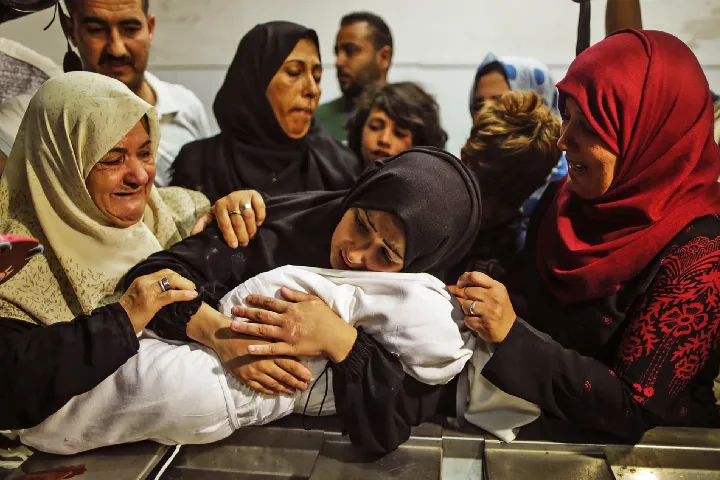The signals of endgame in the Hamas-Israel conflict hint towards more dire consequences. While the Israeli assault in Gaza continues to pile up humanitarian catastrophe, new fronts are set to open up, as the Iranian foreign minister has warned.
Israel has cut all essential supply to the Strip – food, fuel, electricity and humanitarian aid. It has also given a 24-hour ultimatum to the UN mission and Gaza population to vacate the area. It has conditioned the flow of aid to Gaza with the release of Israeli hostages held by Hamas.
These are civilian Egyptians crossing the Gaza border to deliver water and food to #Palestine#HamasTerrorist #Gazagenocide #IsraelFightsBack #IsraelPalestineConflict #Isarael #ChasingThatFeeling #attentat #Gaza_under_attack #GenocideinGaza pic.twitter.com/XnDxI1gEEK
— Anil Kumar (@kumar787518) October 14, 2023
As this article is being written, tens of thousands of Israeli Defence Forces soldiers are stationed near Gaza, ready to enter. Israel’s security cabinet has met multiple times and made decisions that have remarkably not been leaked to the press. Chances are that the ministers were briefed about the IDF’s operational tactics and targets. But has Israel finalised the actual goals of the war?
Strategic Affairs Minister Ron Dermer, the minister closest to Prime Minister Benjamin Netanyahu, spoke only this much: “We need to cripple the capacity of the terrorists.”
Hamas’ future looks bleak. Israel is determined to eradicate it from Gaza and hunt down senior leaders. For Israel, too, any sense of victory will be short-lived.
Should it succeed in exacting vengeance on Hamas, it will be left with a broken Gaza Strip with no obvious exit strategy. To avoid a security and governance vacuum, it will have to either govern the Strip itself, as was the case prior to the Oslo Accords; or bring back a brittle and discredited Palestinian Authority which will struggle to impose its writ.
Either option will create new drivers of political instability and insecurity.
There could be another murky outcome of the conflict. The Israeli euphoria over blitzkrieg and destruction of Gaza will almost certainly radicalise new generations in the region and in the West. This dynamic is a godsend for terrorist groups such as ISIS, Al Qaeda, and new iterations of violent extremism.
At this stage, Iran is a strategic beneficiary: The accession of Saudi Arabia of the Abraham accords has likely been derailed. Qatar, a prime supporter of Hamas, may be quietly savoring its revenge against its Arab competitors in the Gulf. Turkey, a friend of the Muslim Brotherhood, also comes out as a beneficiary relative to Saudi Arabia and Egypt.
As of now, Russia will likely benefit from the sidelining of the war in Ukraine. China basks in the thus far unbankable glow of being cast as a potential mediator.
The United States, which relinquished its role as the strategic prime mover in the region after the so-called red-line crisis of 2013, when it did not intervene in the war in Syria, may reaffirm its primacy. This could reinforce US credibility in Europe. Indeed, there is some talk in Washington of coupling military assistance to Israel and Ukraine.
Meanwhile, all of the above is subject to a brutal change if Hezbollah, supported by Iran, were to enter the war in a big way.
Iran, whose support of Hamas allows it a window into the Arab-Israeli conflict through which it can project its influence and weaken Israel. It has clearly benefited from the Hamas attack which has eroded Israel’s deterrence and constrained Israeli-Saudi normalisation and placed Iran in the dock.
But like Hamas, Iran’s gains could erode if Israel succeeds in weakening the Hamas hold in Gaza or if the conflict broadens and leads to a direct confrontation between Israel and Iran.
Indicating that Iran might be bracing for a “deep jump” into the conflict, its Foreign Minister Hossein Amir-Abdollahian said that the destructive war may expand to “new fronts”.
#Iran FM meets Lebanese parliament chief in #Beirut, discusses Gaza
Iranian Foreign Minister Hossein Amirabdollahian has met with Lebanon’s Parliament Speaker Nabih Berri as he continued his visit to the Arab country.
In the meeting, Amirabdollahian and Berri discussed the… pic.twitter.com/tRbYiqOeEn
— Iran Foreign Ministry
(@IRIMFA_EN) October 13, 2023
“Some European officials asked me if there were any chances that new fronts might open up against the Zionist regime?” Amir-Abdollahian said on Thursday in the Lebanese capital of Beirut, his second stop on a regional tour that also took him to Iraq.
“I told them as long as the Zionists keep up their war crimes, there exists every prospect that other resistance movements (may enter the war),” he added.
“We are in Beirut to announce with a loud voice that, along with (other) Muslim countries and governments, we will not break the Zionist regime’s crimes against the people of Gaza.” Amir-Abdollahian said.
Echoing this, Lebanese resistance movement Hezbollah said the group’s “guns and rockets” were with Palestinian fighters.
Iraq’s anti-terror group Kata’ib Hezbollah threatened to target American bases in the Arab country and the entire region if the US intervened in the ongoing fighting between the Palestinian fighters and the Israeli regime.
However, undaunted by these “threats”, Israeli opposition leader and former prime minister Yair Lapid told France 24 that there will only be one endgame of the conflict: “There will be no Hamas in Gaza.”




















